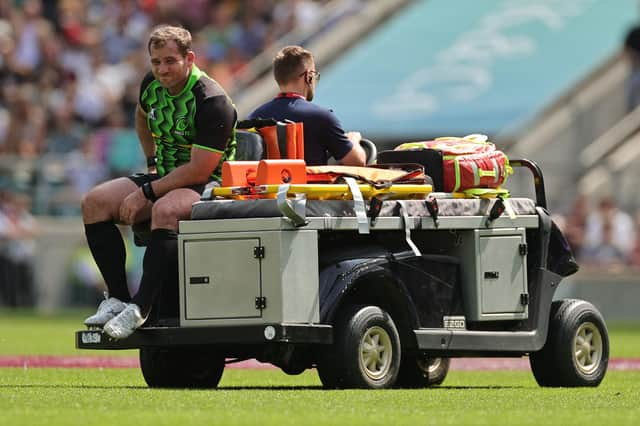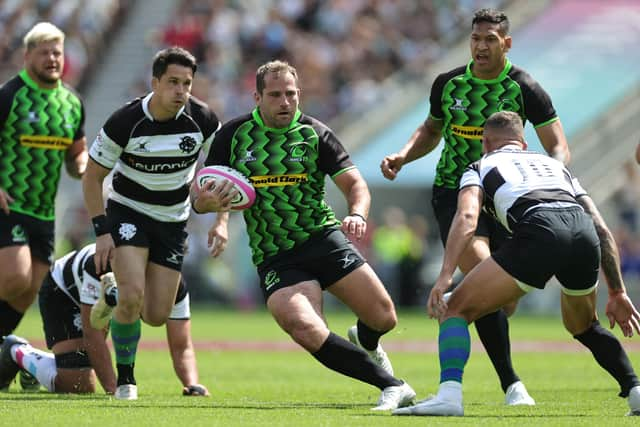Fraser Brown: I will retire at some point but it will be on my terms and I’m not ready to do that yet


It happened whilst playing for the World XV against the Barbarians. To some these games are an unnecessary risk at the end of a long season but for players they are an opportunity to play the game we love with world class players on a stage not stifled by the usual ‘must win mentality’. We were kicking off after the Baa-Baas had scored a maul try of all things. The ball got tapped back to me and when I went to change direction off my left foot my knee gave way. Quade Cooper was directly in front of me and, stupidly in now transpires, I tried to step him rather than just go over the top of him.
There are a few ways you can injure your ACL but one of the most common mechanisms is a twist or change of direction without any contact and this is exactly what happened to me. It’s hard to describe exactly what you feel as it goes but it’s as if you the top part of your knee and the bottom half move in completely opposite ways at the same time, it sort of wobbles. It does really jar but almost like an elastic band has just pinged. It wasn’t particularly painful which you may think is a positive sign of no significant injury but I’ve learnt over time that no pain often means there is nothing left attached to cause any pain!
Advertisement
Hide AdAdvertisement
Hide AdSo I was lying on the ground and Quade was asking me if I was all right and I said, “No, I’ve done my ACL!” And he said, “No you’ve not!” I assured him I had, and the game got stopped and the medics came on and said, “Are you OK, have you hit your head?” And, again, I was like, “No, I’ve done my ACL!” They suggested that I’d probably just jarred it and I had to say to them: “I promise you, I’ve done my ACL.” As I’ve said, I’ve never done it before but sometimes you just know.


Like all world class stadiums, the facilities at Twickenham are excellent. When you go to the medical room, they take your blood pressure, your oxygen levels, your pulse and do a basic assessment like you would receive in hospital. Then they wheel you through for an X-ray to rule out any breaks. Once assessed if there is no immediate risk or danger, onto crutches and watch the end of the game. Post-game I got assessed again, my knee got strapped up and then the next day I flew back up to Edinburgh. I was assessed again on the Tuesday morning by the medics at Glasgow, scanned later that morning and got the results on Tuesday evening, a phone call from one of the medics confirming my ACL was gone. Even though I was almost certain what the scan would show, I was still absolutely devastated when I was told the news.
You ask the medics to be brutally honest with you. I’m a 34-year-old front-rower. Doing an ACL in your early 20s is a serious injury. Doing it as an older athlete is more difficult, there’s more milage on the clock. I have made a career out of fighting difficult battles, this one is no different.
There were two options; no surgery and retire or surgery to continue playing. There was only ever one option!
I want to continue playing, so there was no doubt in my mind - I wanted surgery to fix my knee so that I could continue my career. I will retire at some point, but it will be on my terms and I’m not ready to do that yet. I enjoy my rugby; I love the sport and I still love running out on a Friday night and a Saturday afternoon.
The next step was the operation and that was done by Graham Lawson who works at Spire in Edinburgh and is a brilliant surgeon who I’ve seen before. When they operate on your ACL they take a graft from another tendon in my case the my hamstring tendon from the same leg. They cut you open, go in and cut bits and pieces of tissue from different tendons which is called the ‘graft’ then they tie it together like a bit of rope. They then drill two holes in your knee and attach the graft. This is your new ACL.
Because the graft was taken from the same leg, five or six days after surgery I was able to walk without crutches relatively pain free. I’ve started rehab. In the first week you don’t do anything except try to get a bit of range because it’s important to try to get that full leg extension. Since then I’ve been in at Glasgow, seeing the physios three or four times a
week. A lot of it is around trying to get your quads and hamstrings switched back on because your muscles all go to sleep and you have to teach your legs how to function again.
Advertisement
Hide AdAdvertisement
Hide AdWe’ve actually been documenting it with the media team at Glasgow since the first day that I came in. It’s a very long rehab - about nine months or so - so they will show the process the whole way through, all the milestones, from being able to lift my leg up off the physio’s bed to walking up and down stairs. All these tiny things that you take for granted are actually massive milestones after you’ve had surgery on your ACL.
But it’s not a linear process. For example, it took me four days of trying to be able to bend my leg 110 degrees (which is what you need to be able to sit on a bike). On the day I finally did it, I was sitting on the bike for 15 minutes and I couldn’t do it and then all of a sudden I had this pop of fluid at the back of my knee and it eased up and I could spin and was able to do it for 15-20 minutes. And I did the same the next day. But when I came in three days later I couldn’t do it because my knee felt so much worse than the week before and it took me almost the entire week to get back to where I was nine days previously. Recovery is not straightforward. There are peaks and troughs, and frustrations. It’s a difficult process and you have to keep reminding yourself that you’ve had major surgery to a massively important structure in your body.
It’s a tricky process mentally to navigate because if you look at it day to day you can see very little progress sometimes. Sometimes it feels like you are digging a deeper hole for yourself and that’s when the medics, the physios and the S&C team you’ve got round you are really good because they can tell you when they have to try to pick you up mentally, and give you little things to achieve and encourage you to look at the bigger picture. So as well as looking after your physical recovery, they are also looking out for you mentally.
My return date is somewhere around April or May. Luckily, because of the World Cup, the season starts and finishes later. So instead of finishing in mid-May we’ll be finishing in mid-June. So there will be five or six regular season league games after my planned return date and the hope with Glasgow is that we’ll have some knockout rugby after that.
I’ve been staying involved in the game by coaching Watsonians in the Super Series. Coaching is something I’ve wanted to peruse post playing for several years and although I’d rather be fit and healthy, this injury has given me an excellent opportunity to work on this. It has also given me time to enjoy with my family. My wife and my boys mean everything to me and even the little things like nursery drop-offs and pick-ups are something which I can’t do during the season and something that I really miss.
I mentioned my wife and she has always been the absolute anchor of our family. Jen had a lot to deal with, particularly in the first couple of weeks because I was pretty much immobile and in quite a lot of pain. We’ve got two young children and sleep can be an issue! So she had to deal with all that and deal with me. I’ve said it before but rugby and sport is a very selfish industry. And being injured is an even more selfish industry. Your job is to get fit and get back on the pitch playing because that is what you’re paid to do. I'm eternally grateful to Jen and although I won’t be playing for nine months the silver lining is I’ll have weekends free and I’ll be able to spend more time with her and our two boys (as well as watching rugby).
Comments
Want to join the conversation? Please or to comment on this article.
